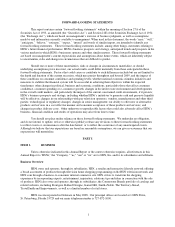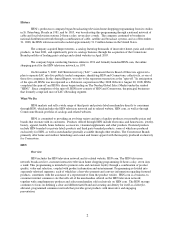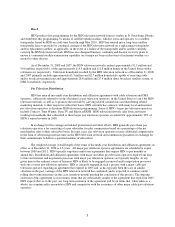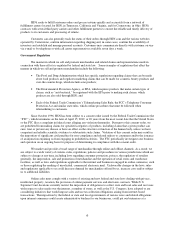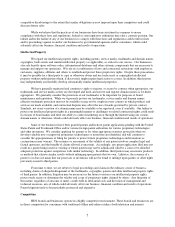Home Shopping Network 2008 Annual Report Download - page 13
Download and view the complete annual report
Please find page 13 of the 2008 Home Shopping Network annual report below. You can navigate through the pages in the report by either clicking on the pages listed below, or by using the keyword search tool below to find specific information within the annual report. 10
We depend on relationships with vendors, manufacturers and other third parties, and any adverse
changes in these relationships could result in a failure to meet customer expectations which could results in lost
sales.
Our businesses purchase merchandise from a wide variety of third party vendors, manufacturers and other
sources pursuant to short- and long-term contracts and purchase orders. The ability of our businesses to identify and
establish relationships with these parties, as well as access quality merchandise in a timely and efficient manner on
acceptable terms and cost, can be challenging. In particular, our businesses purchase a significant amount of
merchandise from vendors and manufacturers abroad, and have experienced (and expect to continue to experience)
increased costs for goods sourced in these markets, particularly in China. We depend on the ability of vendors and
manufacturers in the U.S. and abroad to produce and deliver goods that meet applicable quality standards, which is
impacted by a number of factors not within the control of these parties, such as political or financial instability, trade
restrictions, tariffs, currency exchange rates and transport capacity and costs, among others. In particular,
Cornerstone is dependent, in significant part, upon independent, third party manufacturers to produce private label
merchandise.
The failure of our businesses to identify new vendors and manufacturers, maintain relationships with a
significant number of existing vendors and manufacturers and/or access quality merchandise in a timely and
efficient manner could cause our businesses to miss customer delivery dates or delay scheduled promotions, which
would result in the failure to meet customer expectations and could cause customers to cancel orders or cause our
businesses to be unable to source merchandise in sufficient quantities, which could result in lost sales.
The failure to secure suitable placement for the HSN television network would adversely affect our
ability to attract and retain television viewers and could result in a decrease in revenue.
We are dependent upon the continued ability of HSN to compete for television viewers. Effectively
competing for television viewers is dependent, in substantial part, on the ability of HSN to secure suitable placement
of the HSN television network within a suitable programming tier at a low channel position. The advent of digital
compression technologies and the adoption of digital cable has resulted in increased channel capacity, which
together with other changing laws, rules and regulations regarding cable television ownership, impacts the ability of
HSN to secure suitable channel placement. While increased channel capacity could provide a means through which
the HSN television network could be more widely distributed, it could also adversely affect the ability to attract
television viewers to the HSN television network to the extent it results in:
• higher channel position placement for the HSN television network;
• placement of the HSN television network in digital programming tiers, which generally have lower
levels of television viewer penetration than basic or expanded basic programming tiers;
• more competitors entering the marketplace; or
• more programming options being available to the viewing public in the form of new television
networks and time-shifted viewing (e.g., personal video recorders, video-on-demand, interactive
television and streaming video over broadband internet connections).
If the HSN television network is carried exclusively in a system on a digital programming tier, HSN will
experience a reduction in revenue to the extent that the digital programming tier has less television viewer
penetration than the basic or expanded basic programming tier. In addition, HSN may experience a further
reduction in revenue due to increased television viewing audience fragmentation and to the extent that not all
television sets within a digital cable home are equipped to receive television programming in a digital format. Our
future success will also depend, in part, on the ability of HSN to anticipate and adapt to technological changes and to
offer elements of the HSN television network via new technologies in a cost-effective manner that meet customer
demands and evolving industry standards.



